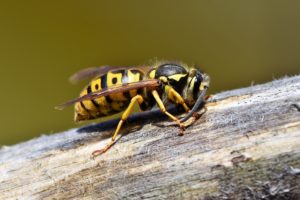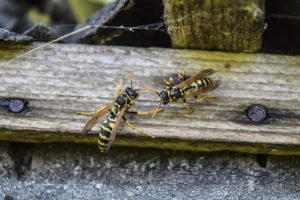August 14th, 2018 by
Aggressive Wasps Encountered in Large Numbers Across the Country
The unseasonably hot summer has seen a huge increase in the number of wasps, leading to one of the worst summers for pest control in history, experts have said.  Pest control experts have also warned that an anticipated warm autumn could see the wasps remaining active in large numbers for much longer than usual. Pest controllers have been destroying around 12 wasp nests a day throughout summer, far higher than the usual average. During summer, wasps build large nests from chewed up tree pulp and can become quite aggressive if they feel their nests are under threat. The wasp queen stays in the nest to lay eggs while the wasp workers fly out to search for food. The wasps themselves cannot actually eat this food, rather they bring it back to the newly-hatched larvae who eat it and produce a sugary syrup, which the wasps can drink. After summer ends, the queen stops laying eggs, meaning the wasps run out of sugary syrup to drink and must leave the nest to search for other food sources. This search for food leads wasps to be attracted to fermenting fruit, which breaks down into a sugary liquid as it rots. This fermented fruit also contains alcohol, which means wasps often become intoxicated and highly aggressive in the autumn time. Due to the high number of wasps reported in the summer, it is highly likely there will be many more aggressive wasps roaming Britain into the autumn, so it’s advised to be prepared.
Pest control experts have also warned that an anticipated warm autumn could see the wasps remaining active in large numbers for much longer than usual. Pest controllers have been destroying around 12 wasp nests a day throughout summer, far higher than the usual average. During summer, wasps build large nests from chewed up tree pulp and can become quite aggressive if they feel their nests are under threat. The wasp queen stays in the nest to lay eggs while the wasp workers fly out to search for food. The wasps themselves cannot actually eat this food, rather they bring it back to the newly-hatched larvae who eat it and produce a sugary syrup, which the wasps can drink. After summer ends, the queen stops laying eggs, meaning the wasps run out of sugary syrup to drink and must leave the nest to search for other food sources. This search for food leads wasps to be attracted to fermenting fruit, which breaks down into a sugary liquid as it rots. This fermented fruit also contains alcohol, which means wasps often become intoxicated and highly aggressive in the autumn time. Due to the high number of wasps reported in the summer, it is highly likely there will be many more aggressive wasps roaming Britain into the autumn, so it’s advised to be prepared.
How to Keep Wasps Away from Your Garden
 Ensure you keep your garden clear of rubbish and especially food waste. If you have fruit trees, regularly check on them and pick up any fruit that falls before it starts to rot. Wasps dislike all types of mint and especially dislike peppermint, so make use of peppermint oil around your home and garden to keep wasps away. Dilute a little in water and spray it around your garden and home for an eco-friendly pest control solution. You can also use other products containing peppermint oil, such as this spider repellent which, while designed to repel spiders, actually deters wasps as well thanks to its minty scent. You could also try planting peppermint in your garden, which you may find helps reduce the number of wasps you see.
Ensure you keep your garden clear of rubbish and especially food waste. If you have fruit trees, regularly check on them and pick up any fruit that falls before it starts to rot. Wasps dislike all types of mint and especially dislike peppermint, so make use of peppermint oil around your home and garden to keep wasps away. Dilute a little in water and spray it around your garden and home for an eco-friendly pest control solution. You can also use other products containing peppermint oil, such as this spider repellent which, while designed to repel spiders, actually deters wasps as well thanks to its minty scent. You could also try planting peppermint in your garden, which you may find helps reduce the number of wasps you see.
Comments
Leave a reply
Your e-mail address will not be published. All fields are required


